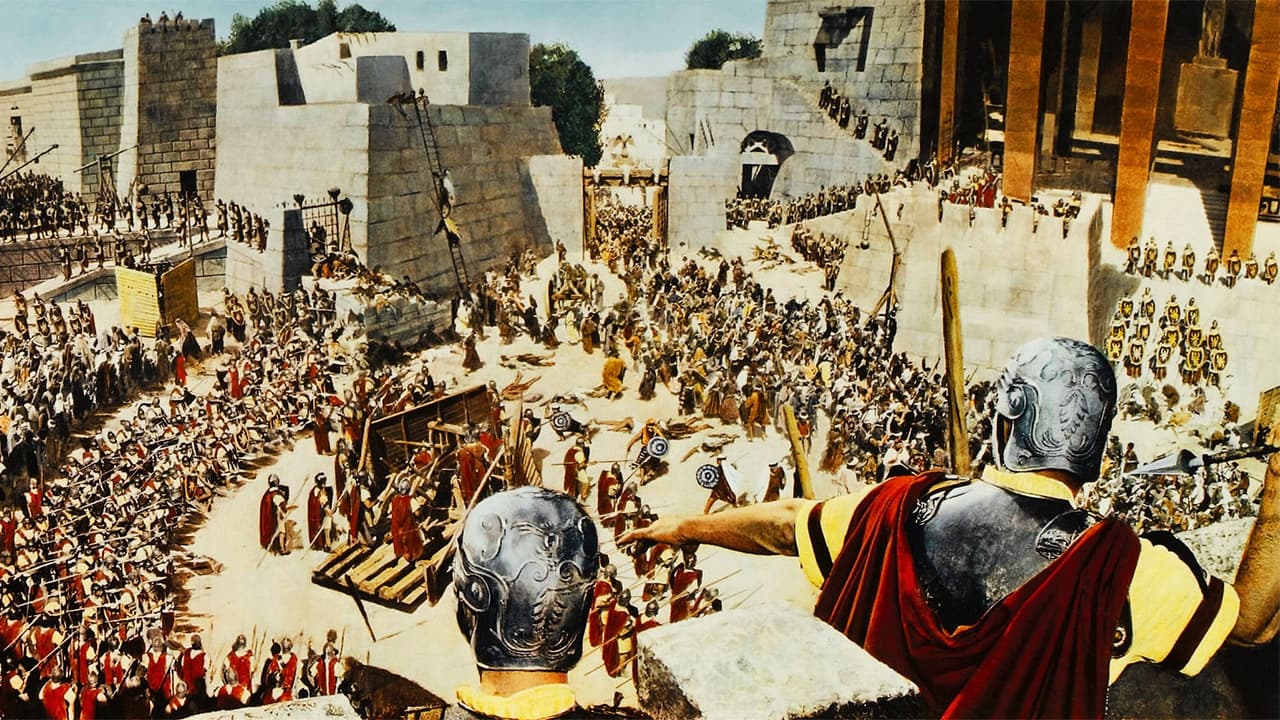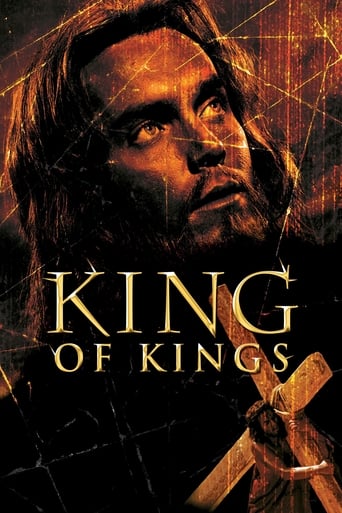

Watch it only to marvel at the costume design and Salomé's dance. The script sounds like some bad Sunday-morning gospel broadcast, the wigs and fake beards are laughable. Robert Ryan looks either doped-up or ashamed. There are over-long scenes of people exchanging Significant Looks! The infant-death scenes look like outtakes from The Ten Commandments.This is a ponderous sea slug of a movie that you might put up as a silent background to some kind of ironic party. Cecil B. obviously took himself and his own religious beliefs very seriously--you have to wonder why he didn't take up TV evangelism.
... View MoreI own A DVD of this film and try to watch it at Easter time about every second or third year. In my view, it's the best and most reverent depiction of Christ's life that I've seen with a wonderful score by Miklos Rozsa and excellent production values associated with the epics of the famous producer Samuel Bronston (El Cid, Fall of the Roman Empire). Moreover, Orson Welles' splendid narration conveys the right amount of solemnity and descriptiveness.I'm well aware that King of Kings was largely panned by critics when first released, and although it has gained much in stature in recent decades, it still has its share of critics. Much of that criticism seems to be based on the blue-eyed, heartthrob Jeffrey Hunter playing Jesus in the film, and it was reported that he was selected for the positive effect his looks would have on the box office. But he's grown on me; he has a very rich and charismatic voice and a penetrating stare that conveys an other-worldly look ("my kingdom is not of this world"). His performance in the Sermon on the Mount is commanding and when asked "teach us to pray", his recitation of the Lord's Prayer is soaring and emotional. There's sympathy in his depiction of Jesus: "woman, where are they that condemn you?"; there's steadfastness: "do not tempt the Lord thy God! (to Satan in the wilderness), there's fear: "take this cup from me!" and then there's inscrutable resignation: no responses to Pilate's "art thou a God?" The doctrine of the Incarnation must make playing Christ extremely difficult as you must convey divine attributes and very human emotions.For my money, the best scenes for staging, visual and sound / musical effects, reverence, and spiritual depth and intensity are the aforementioned Sermon on the Mount, the temptations in the wilderness, Jesus' the extinction on the cross followed by dark clouds and rushing wind and the final acknowledgment of God's presence by the cynical centurion, and finally the off-camera presence revealed by a lengthening shadow of Christ's final admonition to the disciples at the Sea of Galilee to "go and make disciples of all nations" amid the soaring music of Rozas. Very inspiring moments! My one criticism, and I thought of knocking the rating down to a 9 because of this but did not, was the over-emphasis on Barabbas and his mission to violently oppose the Romans and free Judea. Barabbas was interested in political freedom. Compare this to Jesus who tells the guards of John the Baptist, who remains in his dungeon, that "I've come to free John from within himself." I suspect the minutes of the film given to Barabbas and his cohort were an excuse to provide several superfluous battle scenes with the Romans, add some unneeded "action" and attract younger audiences. Jesus is not El Cid!
... View MoreNicholas Ray directed this reverent telling of the life of Jesus Christ(played by Jeffrey Hunter) from his birth in Bethlehem, the visit of the three wise men, to his adult years, where he preached loyalty to the one God and doing good works as the path to Heaven. This gets him in trouble with the Roman authorities, who disagree with his teachings and consider them contrary to Roman belief and law. As Jesus's followers(such as John The Baptist, who gets into his own trouble) and legend grows, Roman leader Pontius Pilate feels compelled to intervene and put an end to this divine messenger by ordering his Crucifiction, though this barbaric practice does not end the matter at all... Fine biblical drama doesn't quite have the same dramatic impact as "Ben-Hur",(more like "The Ten Commandments") but is still nicely done.
... View MoreThis highly regarded epic deals with a dramatic recreation of the life of Christ from the Annunciation , Crucifixion , Resurrection , through the Ascention . Interesting retelling at the life and teachings of Christ (Jeffrey Hunter) from a political , historical and religious view point . The film includes all of the major events referred to in the New Testament with descriptive Biblical passages ; his birth in Bethlehem and visit by three Magician Kings , his existence in desert tempted by Satan , there he knows he has a destiny to fulfill ; his subsequent baptism by John the Baptist (Robert Ryan) ; the miracles as cripples walking , blind men seeing ; the fishes and the loaves ; his relationship to 12 apostles and so on . Jesus Christ's journey from Galilee to Golgotha is portrayed here in thought-provoking as well as enjoyable treatment . The film actually begins with the Roman invasion by Pompey (Conrado San Martin) in 65 B.C., the appointment of King Herod the Great (Gregoire Aslan) by the Romans and finally the crowning of Herod Antipas (Frank Thring) after he murders his father . The revolt led by Barrabbas is also included and John the Baptist's beheading as Salome's price for dancing for Herod . However , not completely reverential at some Biblical characters such as Judas Iscariote (Rip Torn) , Pontius Pilate (Hurd Hatfield) and Barrabbas (Harry Guardino) , portraying the man less a thief than as a political revolutionary . As Barrabbas and followers struggle to deal with seek the best course of resistance to Roman oppression embodied by the political savvy Pontius Pilate . In addition , the scenes between John the Baptist , Herod (Frank Thring) , Herodias (Rita Gam) , and Salome (Brigid Bazlen) are supposedly based more on Oscar Wilde's play "Salome", than on the Bible, though Salome's grisly behavior as depicted by Wilde is not shown . This is an impressive story of the life of Jesus Christ from his birth in Bethlehem to his Crucifixion and subsequent Resurrection . Filmed on a relatively grand scale , being efficiently produced by the great Samuel Bronston along with Jaime Prades . Life of Christ is intelligently told by prestigious screenwriter Philip Yordan , including glowing cinematography by Manuel Berenguer and Milton Krasner , an attractive visual style , memorable soundtrack by the classical Miklos Rozsa and excellent cast giving larger-than-life interpretation . Good-looking Jeffrey Hunter in exactly the right role , he gives a dedicated effort at the character , his acting has power , nobility and subtlety . However , the crucifixion scene had to be re-shot because a preview audience was offended at Jesus/Jeffrey Hunter having a hairy chest . Due to Jeffrey Hunter's youthful, teen-idol appeal, the film was jokingly referred to within the industry as "I Was a Teenage Jesus" , in imitation of the low-budget teen-audience successes of the 50s and 60s . Fine support cast such as Rip Torn as a furtive as well as shifty Judas , Robert Ryan plays a splendid John the Baptiste , Frank Thring as Herod Antipas , Siobhan McKenna as Mary , Hurd Hatfield as Pontius Pilate , Ron Randell as Lucius , Guy Rolfe as Caiaphas , Royal Dano as Peter , among others . Being a US/Spanish co-production shot in Spain there appears several Spanish actors in brief performances such as Antonio Mayans as Young John , Luis Prendes as Good Thief , José Nieto as Caspar , Rubén Rojo as Matthew , Fernando Sancho as Madman , Félix de Pomés as Joseph of Arimathea , Rafael Luis Calvo as Simon of Cyrene , Paco Morán as Blind Man , Conrado San Martin as Pompey , and Carmen Sevilla as Mary Magdalene ; furthermore , Aldo Sambrell's film debut as Roman soldier and Paul Naschy as a Jewish . Breathtaking and majestic production design by Enrique Alarcon , filmed on location in Chinchon , Manzanares , Navacerrada , Madrid , and Chamartin studios , Spain . The motion picture was compellingly directed by Nicholas Ray . ¨King of Kings¨ is the yardstick by which all Jesus movies are to be measure . Other pictures dealing with his divine presence are the following : ¨King of Kings¨ (released in 1927) , first silent version by Cecil B. DeMille with H.B. Wagner ; ¨The greatest story ever told¨ (1965) by George Stevens with Max Von Sidow , Charlton Heston , Jose Ferrer , Sidney Poitier , Claude Rains ; ¨Gospel according to Matthew¨ by Pier Paolo Pasolini with Enrique Irazoqui as Jesus ; ¨Jesus Christ Superstar¨(1977) by Norman Jewison with Ted Neeley and Carl Anderson ; ¨Jesus de Nazareth¨(1977) by Franco Zeffirelli with Robert Powell , Olivia Hussey , James Mason , Laurence Olivier , Anne Brancfort , Fernando Rey ; ¨Last temptation of Christ¨ by Martin Scorsese with Willem Dafoe , David Bowie , Harvey Keitel , Ian Holm , Harry Dean Staton ; and ¨The Passion of the Christ¨ (2004) by Mel Gibson with James Cazievel , Maia Morgenstern and Monica Belucci .
... View More